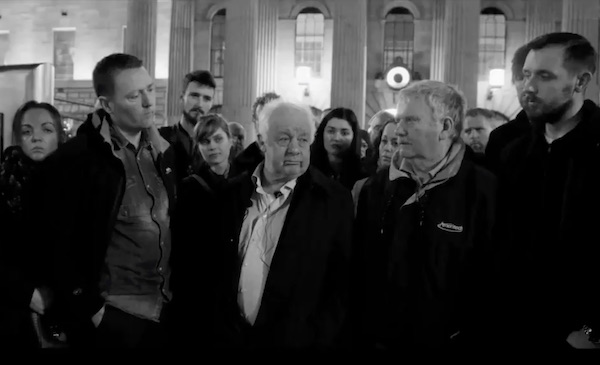
A group of Irish celebrities have spearheaded an action to tackle the homelessness crisis by taking over a government-owned property to provide accommodation.
About 100 people, lead by personalities such as Oscar-nominated director Jim Sheridan and acclaimed songwriter Glen Hansard, gathered in Dublin on Thursday night to take over Apollo House. The office building is owned by NAMA, the state-run assets management authority set up in the wake of the 2008 financial crisis, and has been vacant for some time.
In a video released by ‘Home Sweet Home’, Mr Sheridan said: “We want to give everyone a roof over their heads at Christmas. Is that too much to ask?” He said the activists were merely “borrowing” the building for three months.
Appearing on the Late Late talk show, where he was loudly and repeatedly applauded, Mr Hansard described the action as an “act of civil disobedience”.
“I call upon the better spirt of the Irish people to look at this,” he said. “Can you imagine walking home on Christmas Eve and there’s no homeless people on the streets?”
Co-founder of ‘Home Sweet Home’, trade unionist Brendan Ogle, said the group had identified the city centre property to stage a “citizens’ intervention in the homelessness crisis”. He described the property as “lying empty and belonging to us, the Irish people” and said the “intervention” had two key components - a practical one to provide “safe, warm accommodation”, and to “focus national and international attention on the unacceptability of buildings lying empty while people are homeless”.
Unlike other European countries, Ireland has no tradition of organised squatting, and property rights are normally sacrosanct. But the coalition of trade unionists, poets, actors, singers, and rock bands has highlighted an extraordinary contradiction in which tens of thousands of properties remain empty amid a devastating crisis which has pushed thousands out of their homes.
There are 35,000 empty homes lying idle in Dublin alone, with the number countrywide been over the 230,000 mark. Official figures show a 56% increase in the amount of people sleeping rough on the streets of the capital since last winter as homelessness reaches new shocking levels. Some 142 people were counted sleeping rough in Dublin last week at the twice yearly count. The true number of people homeless is much higher as the ‘hidden homeless’ numbers are unknown.
The crisis has forced students to crowd into cramped, low-quality housing and has impoverished workers who have been paying the rack rents currently being demanded by both Irish and international landlords.
There has been widespread support for the effort from a range of civic groups and political parties, including from Sinn Fein and republican groups. Sinn Fein’s Peadar Toibin said: “I admire the inventiveness and drive behind the ‘Home Sweet Home’ campaign. I wish this project all the best and it is my hope is that the government will follow suit and put the many buildings and acres of land lying idle around the country to good use - and build the homes that are so badly needed in this state.”
A decision this week by the Fine Gael Minister for the Environment Simon Coveney, to limit rent increases to 4% a year in “rent pressure zones” in Dublin and Cork was widely criticised as too little, too late.
The decision, announced after lengthy wrangling with the Fianna Fail supporters of his minority, was strongly condemned by Sinn Fein and left wing groups.
Anti-Austerity Alliance TD Paul Murphy and Sinn Fein’s Eoin O Broin pointed out the measures would mean a 12 per cent increase in rents in the identified zones over the next three years, while provoking untrammelled rent hikes in the rest of the country, which includes some of the most affected areas.
“This will continue to heap pressure on struggling renters, and lock low income families and single people out of the rental market,” Mr O Broin said. He pointed to the clear link between the high cost of rent and homelessness.
“The picture for the three quarters of a million people living in the private rental sector is bleak,” he said. “Despite its dramatic growth, the private rental sector is badly regulated. High rents, insecure tenure and poor standards are all too common. Renters may have accommodation but rarely have a home.”
![[Irish Republican News]](https://republican-news.org/graphics/title_gifs/rn.gif)
![[Irish Republican News]](https://republican-news.org/graphics/title_gifs/harp.gif)

